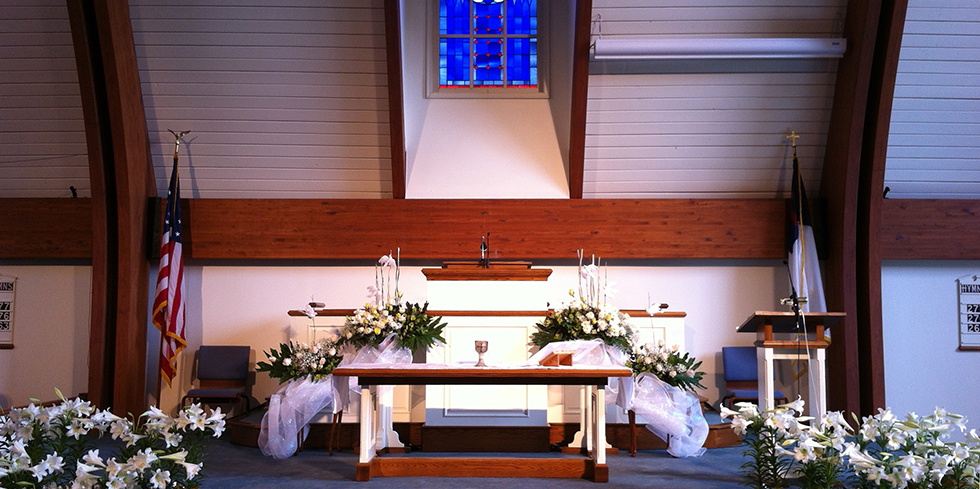If there were one aspect of the Anglican pattern of worship in The Book of Common Prayer that draws the most questions it is the singing of the Psalms of the Old Testament. Especially in today’s church culture with the predominance of contemporary Christian music (CCM), singing the Psalms (also known as the Psalter) is a foreign practice. The congregation of All Souls Anglican Church are a Psalm-singing people. The question, though, is why?
A Survey of Psalm-Singing
Songs of Israel
We sing the Psalms because the people of God have been doing so since as early as Moses (Ps. 90) and especially during the days of David, when the Psalter became the “hymnal” of Israel. When we sing them, we identify with our most ancient forefathers and offer transcendent praise, applicable in all times and in all places.
Songs of Jesus
We sing the Psalms because Jesus sang them. As a Jew, Jesus was “born under the law” (Gal. 4:4), which meant he was required to live according to all God’s commandments. One such commandment was that every male Israelite was required to assemble three times a year at the holy sanctuary for public worship (Lev. 23; Num. 28–29; Deut. 16:1–17). At the temple Jesus would have heard the singing of the Psalms (e.g., 1 Chron. 16). Jesus also would have learned to sing psalms in weekly synagogue services, which he still attended as an adult (Luke 4:16–21). As well, at the Last Supper, Jesus and his disciples “sang a hymn” (Matt. 26:30; Mark 14:26). This gathering was for the Passover observance (Ex. 12:1–28, 43–51; 13:3–16). Although not commanded in Scripture, Jewish tradition used a section of the Psalter known as the “Hallel” (“praise”) Psalms during that feast: Psalms 113–118. It is likely that these are the “hymns” Jesus and his disciples sang.
Songs of the Apostles
We sing the Psalms because the apostles sang them. Though overlooked by the modern church, it is a fact of the New Testament and church history that the Psalter continued to serve as the “hymnal” of the Christian church. After his ascension, Jesus’ church continued the practice of utilizing the Psalms in their prayer and praise to God. When the early, persecuted church “lifted their voices together to God” in prayer, Luke records them reciting Psalm 146:6 and Psalm 2:1–2 (Acts 4:24–26). Paul commended the singing of “psalms, hymns, and spiritual songs” as a means of praise to God and edification of one another as brothers and sisters in Christ (Eph. 5:19; Col. 3:16). James commands those that are downcast in soul to pray and those who are cheerful to “sing praises/psalms” (psallet?; Jas. 5:13).
Songs of the Historic Church
We sing the Psalms because the historic Church has ever sung them. In the words of the ancient historian, Eusebius (263–339):
The command to sing Psalms in the name of the Lord was obeyed by everyone in every place: for the command to sing is in force in all churches which exist among nations, not only the Greeks but also throughout the whole world, and in towns, villages and in the fields.
One of the creative and meaningful things early Christians did in their singing of the Psalms to signify that the Old Testament songs of Israel were the songs of the new covenant church was to sing the Gloria Patri after each Psalm: “Glory be to the Father, and to the Son, and to the Holy Ghost. As it was in the beginning, is now, and ever shall be: world without end. Amen.” This is a statement that the God of the Psalter is the Triune God. Though the ancient church had a rich heritage of psalm singing, it became the exclusive practice of the monasteries over time by the time of the Protestant Reformation.
What was revolutionary about the Reformation was the restoration of psalm-singing to the public worship of God. This was so vital that Louis Benson, an expert in the history of Christian singing, said:
The singing of Psalms became the Reformed cultus [worship], the characteristic note distinguishing its worship from that of the Roman Catholic Church, and, The family in the home, men and women at their daily tasks, were recognized as Huguenots [Reformed Christians in France] because they were heard singing Psalms.
To show that it was reviving this ancient practice, the English Reformers included the Gloria Patri at the end of every read and sung psalm in its services of Morning and Evening Prayer in The Book of Common Prayer.
Why Sing the Psalms?
A Love for God’s Word
First and foremost, we sing the Psalms because we love the Word of God. We believe God commands us to sing the Psalms and the examples of his people doing so are found all throughout his Word. And so he has given us this collection of meditations, prayers, and songs to use in our praise of him. As Jesus said, “If you love me, you will keep my commandments” (John 14:15).
This is such an important point, because if we as Christians truly claim to believe that the Bible is the Word of God—his speech to us (2 Tim. 3:16)—then we need to put that principle into practice. As a congregation and as believers we are seeking to implement our doctrine of Scripture in practical way. In public worship the reading and preaching the Word is central. In personal and family devotions we read, meditate on, and memorize Scripture. And together, we are doing this in the songs that we sing publicly and privately.
A Spirit-Filled Sanctification
Another reason for singing the Psalms is because this is a means that the Holy Spirit uses to sanctify us, that is, make us more and more like Jesus (Rom. 8:29). We learn in Scripture that there is an intimate connection between the Holy Spirit and the Word, and the Psalms in particular. In Hebrews 3:7 the apostolic author cites Psalm 95, saying, “as the Holy Spirit says.” And Paul exhorts us to live a wise life in the midst of evil days (Eph. 5:15–16), warning us, “do not get drunk with wine . . . but be filled with the Spirit” (Eph. 5:18). What does it look like to be Spirit-filled in contrast to the spirit of the world? Paul goes on to say, “Addressing one another in psalms and hymns and spiritual songs, singing and making melody to the Lord with your heart” (Eph. 5:19).
What this means is that the Spirit’s sanctifying work in our hearts is linked to our singing psalms to him with our hearts. In the parallel passage in Colossians, Paul teaches that singing such songs is the means by which “the word of Christ [will] dwell in [us] richly” (Col. 3:16). When we sing the Psalms, then, we are engaging the Holy Spirit and the Word, which Jesus said is how we are sanctified (John 17:17).
This Spirit-and-Word-filled life was expressed by John Chrysostom (347–407), known as the great preacher of the ancient church, in these words:
Do you wish to be happy? Do you want to know how to spend the day truly blessed? I offer you a drink that is spiritual. This is not a drink for drunkenness that would cut off even meaningful speech. This does not cause us to babble. It does not disturb our vision. Here it is: Learn to sing Psalms! Then you will see pleasure indeed. Those who have learned to sing with the psalms are easily filled with the Holy Spirit.
A Holistic Humanity
A third reason we sing the Psalms is that by doing so we exercise all our affections, emotions, and passions in our relationship with God through singing. The Psalms are a complete guide for spiritual life. And since in Christ we are being renewed in the original image of God in which we were made (Eph. 4:24; Col. 3:10), the Psalms assist us in finding and expressing a holistic humanity.
Again, this is so important in our day when much of modern Christianity focuses just on one aspect of our humanity: happiness. But deep down inside we should know better; our humanity is more holistic. In the Psalter God teaches us how to express the entire range of our emotions and experiences. As the ancient theologian, Athanasius (296–373), said:
Elsewhere in the Bible you read only that the Law commands this or that to be done, you listen to the Prophets to learn about the Savior’s coming, or you turn to the historical books to learn the doings of the kings and holy men; but in the Psalter, besides all these things, you learn about yourself. You find depicted in it all the movements of your soul, all its changes, its ups and downs, its failures and recoveries. Moreover, whatever your particular need or trouble, from this same book you can select a form of words to fit it, so that you do not merely hear and then pass on, but learn the way to remedy your ill.
The Psalms present authentic, even raw, humanity before the face of Almighty God. They express the exuberance of praise: “Bless the Lord, O my soul, and all that is within me, bless his holy name!” (Ps. 103:1) They express the pain of persecution: “Even my close friend in whom I trusted, who ate my bread, has lifted his heel against me” (Ps. 41:9). They express the hope of heaven: “As for me, I shall behold your face in righteousness; when I awake, I shall be satisfied with your likeness” (Ps. 17:15). They express the plea for justice: “Give justice to the weak and the fatherless; maintain the right of the afflicted and the destitute. Rescue the weak and the needy; deliver them from the hand of the wicked” (Ps. 82:2–3). One last beautiful quotation summarized this. John Calvin (1509–1564) wrote:
I have been accustomed to call this book, I think not inappropriately, “An Anatomy of all the Parts of the Soul;” for there is not an emotion of which any one can be conscious that is not here represented as in a mirror. Or rather, the Holy Spirit has here drawn to the life all the griefs, sorrows, fears, doubts, hopes, cares, perplexities, in short, all the distracting emotions with which the minds of men are wont to be agitated. The other parts of Scripture contain the commandments which God enjoined his servants to announce to us. But here the prophets themselves, seeing they are exhibited to us as speaking to God, and laying open all their inmost thoughts and affections, call, or rather draw, each of us to the examination of himself in particulars in order that none of the many infirmities to which we are subject, and of the many vices with which we abound, may remain concealed.
Thank you to our colleague and friend Danny Hyde who wrote this introduction for his congregation at Oceanside URC in California.

